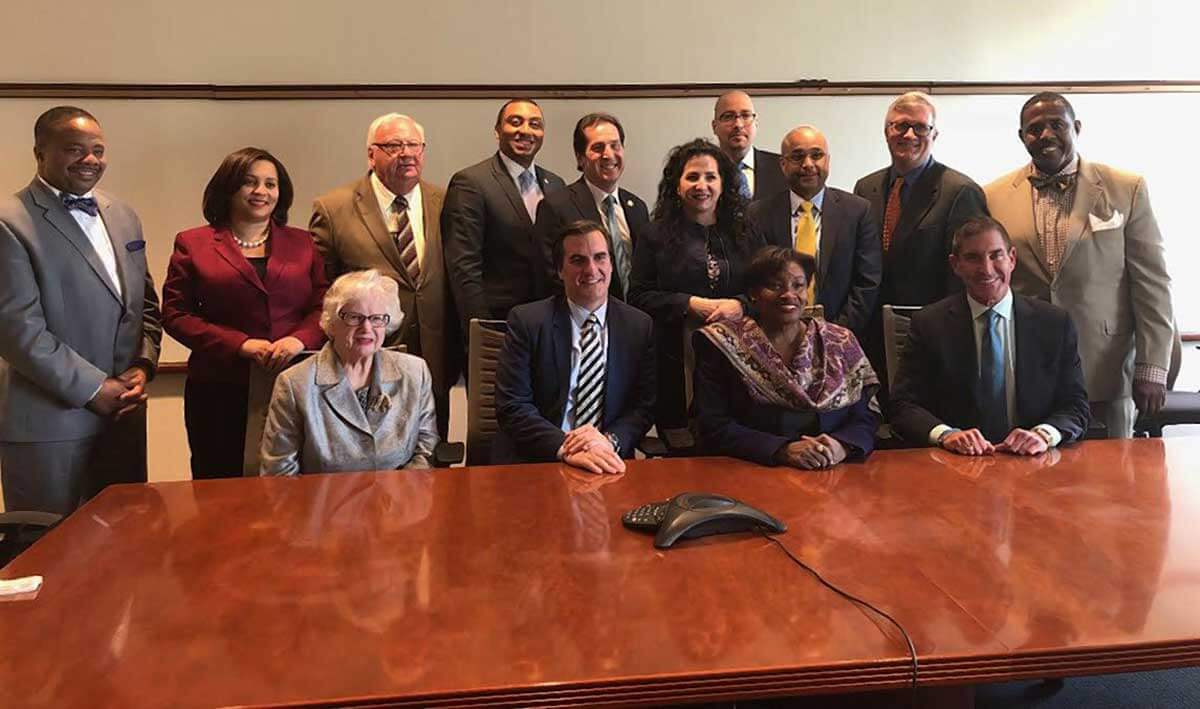By Mark Hallum
State Sen. Jose Peralta (D-East Elmhurst) was smiling as he spoke about the reunification of Democrats in the Legislature and the dissolution of the Independent Democratic Conference in a TimesLedger interview on April 6.
Cuomo and leading members of the IDC announced the plans to bring the mainline party back together in an effort to confront attacks from the Trump administration on progressive values in New York as the mutual desire to win back the majority in the Senate once and for all.
Cuomo led a Manhattan press conference with state Sens. Jeff Klein (D-Bronx) and Andrea Stewart-Cousins (D-Yonkers) April 4 in which he referred to the federal tax plan as an “economic missile” launched at the state and the anti-immigrant stance of the Trump administration as “repugnant” to the progressive values of New Yorkers.
“New York is under attack by an ultraconservative government in Washington that is threatening the progressive soul and economic base of our state,” Cuomo explained at the Manhattan news conference. “Everything we stand for, they are against. Today, we are uniting the Democratic Party to fight a common enemy for the greater good. I want to thank all the individual members for putting aside their personal interests to unify as Democrats and continue to make New York the strong progressive leader that it is. But our work is not done. By joining together as Democrats, we will continue to fight to achieve the entirety of our bold agenda to make New York a fairer, safer, more equal state for all.”
The IDC, which included state Sens. Tony Avella (D-Bayside) and Jose Peralta (D-East Elmhurst), was formed in 2011 in the hope of passing progressive legislation in the face of the conservative Republican majority in Albany.
But the perception that the IDC caucused with the Republicans has been a talking point of their opponents for an extended period of time, and a not completely accurate one, according to Peralta.
“We as IDC were in a separate room [from Democrats and Republicans] talking about what the Republicans wanted and what the mainline Democrats wanted and then we talked about how it was important for our communities, our districts,” Peralta said in the interview. “So we were in a coalition with them, but they never needed us… They had the magic number of 32 [the majority].”
Peralta said there were many “behind the scene fights” with Republicans over anti-immigration bills the IDC members refused to vote in favor of in keeping with the coalition.
Avella had said in months prior that IDC members would consider reunification once Democrats have the majority in the senate.
“Gov. Cuomo, Sen. Stewart-Cousins and I are united in our commitment to bring together the New York State Democratic Party and all Senate Democrats, with the common goal of protecting the people of New York state and solving the state’s most challenging problems,” Klein said on April 5. “Unity cannot wait until a special election. I commend the governor for his unyielding commitment to a successful unification and 2018 electoral victory that will send the message that we stand ready to confront any challenge that comes from Washington. Together, under Gov. Cuomo’s leadership, we are on the right path to demonstrate to New Yorkers and to this nation what we are made of, and the values that we stand for.”
Peace talks between the warring Democrats have been underway for months, however.
In December 2017, mainline Democrats launched an ultimatum against IDC members, warning that if they did not consider reunification and help reclaim two available seats in special elections, they would face intense primary challenges from within the party.
While IDC members weighed their options, political groups geared against the IDC were not backing down.
Up to 37 political action groups statewide signed on to a press release from progressive group No IDC NY, with statements accusing the IDC of caucusing with the GOP, blocking progressive legislation and only agreeing to a Democratic Party reunification deal to avoid primary challenges.
Avella remained circumspect at the time, however, claiming the IDC would remain in autonomous existence, but would operate in coalition with the Democratic Party. The members would continue to caucus amongst themselves; however, he said, making clear that despite rumors to the contrary, the IDC does not caucus with Republicans.
“I’ve always indicated that the conference, myself especially, have always been willing to have this conversation and form a coalition with the Democratic Conference once we have a majority and I stand by that. I’m ready to do that any day, once we have a majority,” Avella said in December.
The Republicans currently hold the majority in the state Senate.
Reach reporter Mark Hallum by e-mail at mhall

































